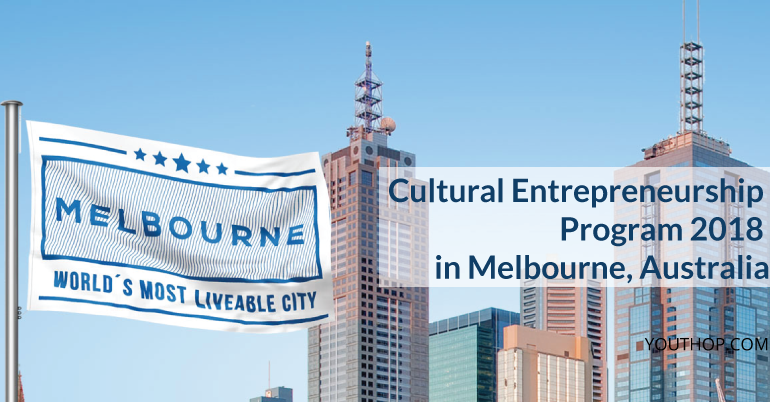Entertainment
Apply! Cultural Entrepreneurship Program

Cultural Entrepreneurship Program 2018 in Melbourne, Australia
Cultural Infusion delivers interactive programs that build acceptance and intercultural understanding among communities and youth for a more harmonious world. Students will meet senior professionals, industry leaders, academic leaders, NGO leaders and leading practitioners who are working in this sector and based in Melbourne, Australia.
Objectives of the Cultural Entrepreneurship Program are:
-To recognize the cultural challenges we face today are generally cultural rather than social. -We meet these challenges with a genuine desire to deepen our understanding of other cultures.
-To promote cultural understanding between participants, which is the base of cultural entrepreneurship.
-To equip students with the ability to make a difference in any context. Also to encourage one another irrespective of their cultural background.
-To develop the mindset of an entrepreneur.
-This creative new program will provide students with the tools to turn abstracts into executable plans.
The course will cover the series of interesting topics. Details are given below.
Deadline
November 30, 2017
Eligibilities
There are no prerequisites or co-requisites for this program.
Benefits
-A unique approach
-The cultural sector is going through a turbulent period. The students acquire the skills to identify and exploit the opportunities of this situation. Economics helps us to do so in several ways:
-The arts are increasingly addressed in terms of financial and economic considerations. Our students will train to argue convincingly in this framework and to challenge preconceived ideas.
-The cultural sector reveals fundamental challenges in mainstream economics, and we address alternative approaches.
Careful application of economic theory and empirical research are powerful tools for making reasonable predictions about further developments in the context of digitization and changes in public policy.
-The programme should not be confused with a conventional course on cultural management. A greater emphasis has put on cutting-edge theory and original empirical research, which is an important aspect of market research, strategic management, and many entrepreneurial projects.
Cultural Concept
-The first topic covered will be the cultural concept which aims to foster a new school of thought in cultural relatability. The goal will be to highlight cultural differences with the view to enhancing understanding between the various groups, going beyond the mediums of art, music and dance and others to achieve this.
-Cultural Infusion believes that culture drives sustainability and quality education. Among other benefits it can also reduce poverty. Culture is key to social cohesion and inclusion for all.
Social entrepreneurship
-Social entrepreneurship combines innovation, resources and the opportunity to tackle social and environmental challenges to benefit society in general. The objective is to create sustainable system changes. Social entrepreneurship aims to solve problems by disrupting existing systems.
-It is important to understand social entrepreneurship before discussing cultural entrepreneurship as those two ideas have a different effect on a company. Being an entrepreneur is not about ideas, it is all about creation and development. Business creation and development will also feature as part of this section.
Cultural entrepreneurship
-Cultural entrepreneurship leads to global change, creates economic value and encourages cultural preservation. It enriches local communities and communities around the world. Cultural entrepreneurship seeks to build understanding between cultures whilst helping dispel wrong assumptions.
By the end of the course, students will have a thorough understanding of cultural entrepreneurship. This will involve an understanding of cultural values, behaviours and ethics, and explain their significance for companies. This will conclude with an explanation of why cultural change precedes social change. Cultural entrepreneurship is the model we are currently moving into.
Skills
You can expect to develop an independence and integrity in developing creative ideas. You will be able to apply entrepreneurial approaches to creative projects and demonstrate an understanding of different business models to establish a creative enterprise. You will also develop team-working and leadership skills, and effective business and communication skills.
Careers
The programme will enable those who have previously studied an area of creative study/practice, such as music, media, theatre and performance, design, or computer games, to start a career developing a business arising from an existing or new creative practice.
This may relate directly to a ‘product’ or ‘process’ arising from you own practice or to a form of ‘expertise’, ‘consultancy’ or ‘knowledge’. The programme will also equip those who wish to work within organisations that develop the infrastructure and environment for new creative businesses with the capacity to flourish in a variety of contexts.
Application
-Instructional Objectives/Course Assessment
-A student who successfully completes this course must demonstrate that he or she is able to:
-Create and pitch their own cultural enterprise
-Deal with cultural issues in the formation of their cultural enterprise
-Convince their peers about the need and relevance of their prospective company
-It would be preferable if students brought their own laptops or tablet devices to take notes. -Wi-Fi access will be provided.
-Reading material will be provided ahead of time.



